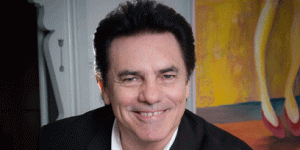End-of-year event: Madama Butterfly in China
On December 4, the Institute celebrated a lively year with a talk by Lyndon Terracini AM, Artistic Director of Opera Australia, on the Opera’s tour of China featuring Matthew Oxembould’s production of Puccini’s Madama Butterfly. His address was followed by festive food and drinks.
Mr Terracini noted that, nowadays, many opera houses around the world are struggling financially. In contrast, Opera Australia has almost doubled its audience over the last few years, despite having to deal with the changing tastes of a wide range of audiences.
The key to Opera Australia’s success is the diversification of their target public to include newer audiences, most notably the Chinese. This has involved building links with Chinese tourism companies to arrange for Chinese tourists to see performances at the Opera House – not just go to the Opera House for photo opportunities. This strategy has proven effective, with Chinese visitors increasingly keen to watch a performance at the Opera House; Chinese audience numbers have doubled.
In October this year, Opera Australia conducted their first tour of China, performing Madama Butterfly in Tianjin, Qingdao, Shenzhen and Zhuhai. There was no government funding for the tour. The tour involved a mix of Chinese and Australian musicians and production crew members including acclaimed Chinese conductor Muhai Tang.
The tour was a tremendous success for Opera Australia. It provided an opportunity for cultural exchange and a strong camaraderie developed among performers and crews. The public reception was also very positive: audiences appeared deeply moved by the production. Mr Terracini indicated that there are plans to do another tour in China next year, and to eventually open an office in China if all goes well. The tour had been a step toward improved understanding between the people of Australian and China.

Mr Terracini emphasised that developing good relationships are essential for making access to new audiences easier. High levels of professionalism and production also need to be maintained for opera companies that travel globally. He noted that it is easier for tour groups to sell tickets for the performances if the tourists already know the performers or directors. Therefore, not only does there need to be a full-time orchestra, but they need to engage with famous directors and singers in order to continually attract the attention of newer audiences.
In response to questions about how to introduce lesser known operas to China, Mr Terracini said that in order to build trust amongst a Chinese base, Opera Australia will first focus on performing the better-known operas, before trying to introduce something new. Mr Terracini is also open to the introducing Chinese opera to Australia as well as diversifying the audience even more to include the Indian and Middle Eastern markets.
Report by Amy Lin
AIIA NSW Intern